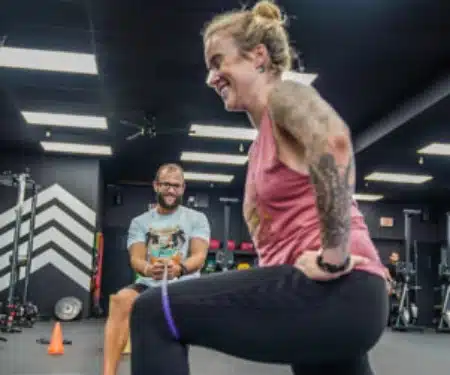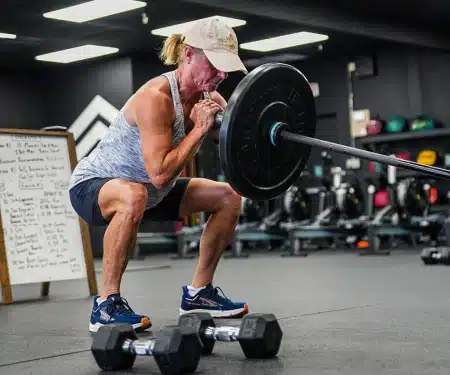The Gym For strength-based Fitness In St. Petersburg
FITNESS
FOR ALL LEVELS
Join Us at St. Petersburg's #1 Functional Fitness Facility
TAKE YOUR FITNESS TO THE NEXT LEVEL
That's Why We've Created
FUNCTIONAL FITNESS PROGRAMS
TAILORED TO MEET YOU WHERE YOU ARE

GROUP FITNESS
Elevate’s signature group fitness is the perfect balance of lifting and cardio throughout the week for an all-around fitness routine that can’t be beat. You’ll be working with barbells, dumbbells, kettlebells, bodyweight movements and traditional “cardio” equipment. Build strength, increase flexibility and send your cardio through the roof. Elevate Kids Group program offers professional coaching for kids aged 10-15, teaching fundamental movement patterns, increased coordination and body awareness to safely develop athletic capacity.

PERSONAL TRAINING & SEMI-PRIVATE TRAINING
Working with a coach in a 1:1 environment or in a small group to address your specific needs and individual goals. Need to develop confidence and competence with certain exercises? Working towards a specific goal? Not sure if your technique is as good as it could be? Our personal training packages may be just what you need.

NUTRITION
Proper nutrition and healthy lifestyle habits are the foundation of your fitness and wellness. With so much information on dieting and nutrition, it can be confusing to figure out the right approach for sustainable results. We make nutrition simple and easy. From weight-loss to performance, our nutrition coaches are well equipped to steer you in the right direction to make your nutrition goals easier.

STRONG AS A MOTHER
Our prenatal exercise and postpartum programs are expertly designed by a pre and postpartum fitness specialist and approved by pelvic health physiotherapists. A completely customized approach to stay safe, healthy and strong throughout pregnancy and postpartum recovery.

PAIN FREE LIFESTYLE
Get and stay out of pain without missing time doing the things you love. Tailored, long-term plans for progress that keep you healthy for years & gives you a life free of limitations.

Perimenopause and Beyond
Stop dieting, increase lean muscle and reduce hormonal symptoms associated with Perimenopause and beyond. Tailored plans for the woman looking to be the best version of herself during these years, without all the setbacks.
WHAT ARE PEOPLE SAYING
SUCCESS STORIES



GETTING STARTED IS AS EASY AS 3, 2, 1.. GO!
1. SCHEDULE YOUR FIRST VISIT below
Discuss your goals with a coach and learn how we can get you to your best self.
2. START YOUR TRAINING
You have defined your goals and you are ready to begin your journey. Start strong by building your foundation with healthy habits.
3. HAVE FUN REACHING NEW LEVELS
Once you have the basics down you’ll book classes easily on our app, enjoy the workouts with awesome people and reach your goals in no time!
start
your
journey!
CLAIM YOUR FREE INTRO SESSION AND TOUR!
By submitting this form you are authorizing Elevate St Pete to communicate with you via email, phone, and/or SMS. Msg & data rates may apply. You may opt-out at any time.



OUR CURRENT SCHEDULE
The Best gym near me in St. Petersburg
WHERE TO FIND US
1150 94th Av N St. Petersburg, FL 33702
GIVE US A CALL
(727)-966-2818
ACHIEVE YOUR FITNESS GOALS
Get Started Today for FREE! No Experience Necessary!
ARE YOU READY TO LEVEL UP?
GETTING STARTED IS EASY!
STEP 1
SCHEDULE YOUR FIRST VISIT
Talk with a coach about your goals and meet our trainers, tour the gym, and learn more about our programs.
STEP 2
START YOUR TRAINING
We will start you strong by taking you through the fundamentals of training and sound habits, putting you on the road to success!
STEP 3
HAVE FUN REACHING NEW LEVELS
Book classes easily on our app, improve your fitness, and enjoy the workouts with awesome people and reach your goals in no time!
THIS IS YOUR CALL TO ACTION...
START YOUR JOURNEY TODAY!
Got Questions? We've Got Answers Right Here!
Super simple! Just click get started anywhere here on the page to book your free intro session where you’ll get to tour the gym & meet our coaches. We will chat about your current situation, your desired situation to see if we can help and if we are good fit for each other.
When you start at Elevate St Pete, your fitness level will improve quickly, usually in the first 30 days. The key to see results is consistency and commitment over time so that’s why we recommend 3 classes per week as a start!
Yes! We provide guidance on eating right or sleeping well which can help maximize energy levels – getting YOU maximum results from your efforts.
Nope! Most of our members start just like you. We assess each new members fitness level. Then our workouts are “universally scaled”, with a different version of each days workout designed for every level. As you level up you can take on more challenging variants of the workout if you desire.
We are locally owned and purpose built to make an impact on the health and happiness in St. Petersburg and the surrounding area.
You’re not just a number here, everyone knows your name. We’re a community of like-minded people that wants you to show up and supports each other on this journey to live better lives – with no judgement or criticism along the way!
We offer exciting, challenging, and varied programming which will keep it fun! All workouts are published in advance. Our pre-planned program design centers around strength based functional fitness. We train with purpose and intention so you can live a life free of limitations. In class, you do movements like barbell squats, kettlebell swings, and body weight movements with traditional cardio exercises. All led by a professional coach.
Each class is led by professional coaches. We always start together with a warm-up designed to activate the muscles being used in the workout. The coach will brief the group on the workout, the movements, and the proper form. During the workout, the coach will be guiding and providing instruction. At the end of class, we will cool down together to accelerate recovery and reduce potential injury.
Strong as a Mother was designed and created out of necessity by our owner, Mallory. Mallory after giving birth to her first son observed a large gap in the fitness space around support for mothers, pelvic floor health, and lack of information around the slew of benefits (both physical and mental) of safe exercise before, during and after pregnancy. Now a pre and postpartum certified fitness specialist, Mallory built the small group Strong as a Mother programs, by moms for moms. Get the support you need in all aspects of the motherhood journey.
Active Life certified professional, Robert Hull, works with you to get you out of pain. Stop being held back by pain limitations and start living pain free. Have you recently been released from physical therapy & are now unsure or hesitant about returning to your daily interests? Are you tired of chronic pain, or have movement limitations that hold you back? Do you want a plan that takes all of your lifestyle factors into consideration-sleep, diet, stress, support system, work schedule, etc. Robert currently serves clients who: Want to return to hiking on vacation, but are afraid after a total hip replacement. Have dealt with on and off back pain for 10 years, avoid picking up heavy objects off the ground, and have discomfort when they run. Tried things in the past like CrossFit, Orangetheory, a regular gym, and nothing quite seems like it was what they really want/or has not provided the results they were looking for.
Elevete’s own professional coach, Brette Peeples, brings years of industry knowledge, experience and scientific insights to help women who are experiencing the effects of perimenopause and menopause symptoms. Are you tired of dieting? Are you not seeing progress where you did in the past? Feeling the hormonal imbalance? This tailored fitness and nutrition program is designed to help you start working with your body instead of against it and start feeling like yourself again. Let’s get to work!








